David Coronel
Timpani
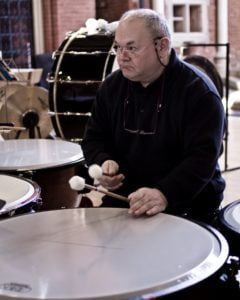
David Coronel joined Bromley Symphony Orchestra in 2001. He had taken up percussion at school, having classes with Stephen Henderson, now a busy freelancer playing with everyone from period instrument bands to the John Wilson Orchestra, although he was then playing for the London Symphony Orchestra. David gave up playing after leaving university, but took it up again in 1996 when he started collecting his own instruments.
The keyword for percussionists is variety – David has a large collection of instruments ranging from the common orchestral items like timpani, bass drums, cymbals and snare drums to more obscure and ethnic items like vibraslaps, agogo bells, lion’s roar and a thundersheet. The worst part of the job is transporting them to and from concerts. When Bromley Symphony played the Berlioz Symphonie Fantastique last season, David also had two church bells on hire, and had to shuttle there and back twice to the hall to get everything home. Fortunately, the new hall at Langley Park has excellent access for percussion, all on the flat. The worst hall he has played in is St.John’s Smith Square, where everything has to be carried up 16 stone steps into the building, and then (usually) up two or three more levels to the back of the stage.
David’s first instrument was the piano, on which he had lessons from the age of five. Once he had joined the school choir and orchestra, however, he lost a lot of his enthusiasm for the piano, preferring the more communal nature of performing in large groups. He did take Grade 8 piano, but only just passed! Although he gave up playing percussion for about 15 years, he has never had a break from choral singing. As soon as he left university, he joined Bromley Philharmonic Choir, of which he is now Chairman, and he also sings with the chamber choir Sine Nomine Singers.
David started a computer business in Bromley in 1983, specialising for many years in the now defunct Acorn computers, switching to standard PCs in the late 1990s. He still runs the business, but from home.
When he first started as a percussionist, the players he admired most were Kurt Hans Goedicke, principal timpanist of the LSO, and the whole section at the CBSO in the late 1970s: James Strebing, Margaret Cotton, Annie Oakley and Douglas Milne. Nowadays there are so many wonderful players around, but the timpanist he most admires and enjoys watching is Paul Turner of the BBC Philharmonic.
David says it would be easy to name all the composers who write the best parts for percussionists as his favourites, but his musical tastes are much more catholic. He used to be a frequent opera-goer, and his best-loved works were those of Handel, Verdi and Janáček, but in general, he doesn’t have favourite composers, or rather, has too many of them. He has had a personal interest in Chabrier and Finzi for many years, and more recently Messiaen and Mahler, but it’s easier to name the composers he dislikes – Vivaldi and Liszt!
The music colleges nowadays produce percussionists of astonishing skill, but one of the side-effects of landing students with massive debts when they leave is that they can’t afford to buy all the instruments they’ll be called to play, let alone the means to transport them. The upshot of all this is that there are relatively few musicians like David who can provide all the gear (hiring everything commercially would be prohibitively expensive), so he is always in demand! Weekends without a concert somewhere are rare, and he often has two.
He started playing for the Whitehall Orchestra before he joined Bromley. They used to be called the Orchestra of the Civil Service, but it’s no longer necessary to be a civil servant to play for them. They only do three concerts a season, but they are adventurous in their choice of repertory, like Bromley, and play to a high standard. He also regularly plays for Harmony Sinfonia, as do other members of Bromley. Harmony has been going since 2009, and is based around Lewisham and Brockley. Despite being formed so recently, they certainly hit the ground running, and have given some excellent concerts. Kensington is well-served with orchestras, and David plays for two of them: Kensington Philharmonic Orchestra plays the same sort of repertoire as Bromley, normally in the very plush surroundings of Chelsea Town Hall; Kensington Chamber Orchestra is a smaller ensemble, and often play contemporary works. Nearer home, he has been timpanist for Sidcup Symphony Orchestra for the last couple of years, and for Kentish Opera for rather longer than that! He also plays for Philharmonia Britannica, Lambeth Wind Orchestra, Lewisham Concert Band, Hayes Symphony Orchestra and the Royal Tunbridge Wells Symphony Orchestra.
Two stories come to mind…
I was playing for Whitehall Orchestra at St.John’s Waterloo, doing Mahler Symphony No.1. I’d engaged a fine but headstrong student from the Royal College as one of the section, and he was allocated the triangle part. As usual, I supplied a suitable triangle supported by a triangle stand, but the student said that he preferred to hold the triangle in his hand. He promptly pulled a length of thread from the lining of his overcoat, strung it through the triangle, and proceeded to play. You may know that this symphony ends with a loud triangle roll which plays right through the final chords: as he was playing it, his makeshift string snapped, and the triangle fell noisily to the floor – the rest of the section could hardly suppress their laughter. I hope he learnt to use the equipment supplied in future…
The other story is more personal, and more painful. I was doing a concert in Streatham which included a piece (I forget which) with a part for rattle. At the beginning of the rehearsal, the conductor proudly brought over an authentic World War II air raid warning rattle, a massive thing like a giant football rattle, and suggested I use that for maximum effect. The cue arrived, and I tried to play but it wouldn’t turn! I realised that, being left-handed, I was trying to turn it the wrong way, so switched direction. Unfortunately, I didn’t move my hand position, so instead of swinging away from me, it whacked straight into my nose! Blood started pouring out, but the show must go on, so I carried on playing, much to the conductor’s amusement. Luckily, I tidied myself up before the evening performance…
Phil McKerracher
Violin, former treasurer
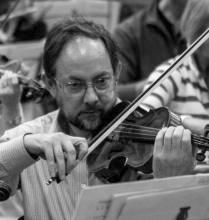
Phil has been a member since 1998. He started learning the violin in Australia at age 8 and still has lessons occasionally. He played in amateur chamber groups, pit orchestras and theatrical productions in Australia before moving to the UK in 1985. Here he has been a regular member of orchestras in Huntingdon, Basingstoke, Kingsclere, Reading, Guildford, London, Leatherhead, Hayes and Bromley, as well as in the pit at the Stag Theatre, Sevenoaks and in smaller ad-hoc groups accompanying choirs or musicals and at weddings. They sometimes pay a modest (amateur) fee but Phil earns a living as a professional electrical engineer and software developer and music is just a hobby.
He also plays piano (rarely in public) but finds the violin particularly rewarding because there is more control over sound character, and because of the social aspect of orchestral playing. Violins often get the main melody and rarely sit silent, counting bars. Also, most orchestras have vacancies for string players. There are many amateur orchestras around here – nearly 200 in Greater London alone – and it would be possible to play in concerts almost every weekend.
Phil’s violin is probably 19th century German and previously belonged to his father. His bow is much more modern and was made recently by a local craftsman.
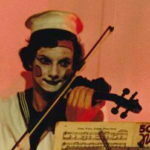
Some memorable events over the years have included seeing a conductor step backwards off the stage and a cellist falling off the stage onto his cello, being hit by flying conductors’ batons, struggling to play in cold and windy conditions, in cramped orchestra pits and by candlelight, playing in costume and makeup on stage, a couple of TV appearances and of course lots of embarrassing mistakes. His other hobbies include maintaining the orchestra’s website and designing and operating lighting and sound for theatrical productions, most recently at the Barn Theatre in Oxted. There are more details and pictures on his website at www.mckerracher.net.
Tarcísio Dantas
Violin
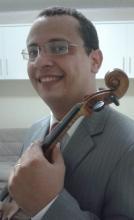
Born In Minas Gerais Brazil, Tarcísio began his music studies at the church of the “Christian Congregation In Brazil”. His development on the violin was initially made possible thanks to his teacher Davi Graton (São Paulo Symphony violin soloist). In 2007 while studying with Ana Ghitã (Romania) he was admitted to the Sergipe Symphony Orchestra, and in 2010 was appointed principal of the second violins. Meanwhile, Tarcísio took part in several master classes with soloists Daniel Guedes, Ronedilk Dantas, Emanuelle Baldini, Elisa Fukuda and Marcio Rodrigues.
In 2008 he began studying music teaching at the Federal University of Sergipe and was one of the creators of the university’s orchestra (Osufs). From 2009 to 2014 he coordinated string teaching at the Youth Orchestra of the Vale of Contiguiba (OSVC) social project, and since 2013 has held the same position at the Youth Orchestra of Aracaju. At the Sergipe Symphony, Tarcisio began a significant musical trajectory, as the soloist in several baroque concertos (including Vivaldi’s Four Seasons, La Stravaganza), playing under the baton of important maestros (Isaac Karabtchevsky, Michel Legrand, Roberto Tibiriçá, Guilherme Mannis, Luiz Malheiro, Ion Bressan, Piotr Borkowski) and taking part in relevant orchestral tours and international music festivals.
Since 2014 Mr. Dantas has been guided by Mrs. Bogumila Burfin (Poland) in Lisboa. In addition to being principal second violinist of the Sergipe Symphony, he’s also concertmaster and assistant conductor at Osufs and a menber of the Bromley Symphony Orchestra in London.
Caroline Marwood
Principal Oboe
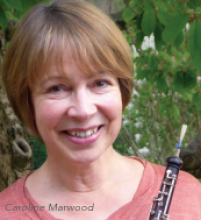
Caroline studied at the Royal Academy of Music with Janet Craxton and Michael Dobson. She worked as a freelance oboist for many years, performing with English National Opera, the English Chamber Orchestra and the London Concert Orchestra, and was involved in productions with the Royal Shakespeare Company including the first London run of Les Miserables. As a member of the Marwood Ensemble, Caroline toured the UK and performed at the Wigmore Hall, on the South Bank and on Radio Three. An Open University degree in Natural Sciences eventually led to a significant career change, and Caroline is now Head of Biology at St Olave’s Grammar School in Orpington Kent. Music is however still an important part of her life; she performs regularly with several chamber music groups and has played principle oboe in Bromley Symphony Orchestra for over 10 years.
Dave Griffiths
Principal Viola
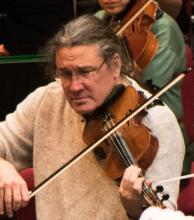
I joined BSO in September 1980, aged 16, on the exact same day that Adrian Brown took over from John Coulling as our conductor although I was briefly in the cello section during the 1963-64 season, my mum Shirley discovering it was difficult not to include me in the months before I was born. I may still owe the treasurer a partial subscription for that season. With my family background I don’t think it was ever even considered that I wouldn’t join BSO; my mum played in the cello section from the 1950s and my dad later became chairman.
I went through the fledgling Bromley Youth music scheme as a kid but, unlike my mother’s side of the family (the ubiquitous Handys of West Wickham/Beckenham), my enthusiasm for classical musical at that age was not sufficient for me to consider going into the profession. I started like so many on the violin but moved over to the viola, because we had one and it is, of course, the prince of all instruments. A few months after joining Bromley, I formed a heavy metal band with a friend from the Bromley Youth Chamber Orchestra viola section!
Over the years I think I have only missed one concert; I very nearly missed one back in the early 1980s when I was violently attacked in Orpington High Street but managed to limp my way through the concert the next day, dosed up on painkillers and viewing the music through one eye (not much of a handicap with viola parts). My attempts to become a rock’n’roll star were doomed to failure (not helped I suspect by qualifying as a Chartered Quantity Surveyor) but I joined another band in 1983 and we are still together 30 years later where I play a variety of keyboards, there being little call for a viola in rock music (other than for firewood of course). In fact my collection of keyboards still regularly appears with BSO, standing in for pipe organs, harps and celestes.
After 33 years, Bromley Symphony Orchestra is part of me – I cannot ever imagine not playing in it and I think we are so lucky to have in Adrian a conductor and musical director who gives ordinary folk like myself a chance to play works that many of the pros never get to play. From a young age, before I was eligible to join BSO, I used to come along and watch the afternoon rehearsals on the day of the concert. As I reached around 14 I noticed a very attractive cellist playing the orchestra during these rehearsals. I kept an eye on her over the next 24 years and sure enough, at the age of 38 I married our current chairman Helen. Not exactly speed-dating, but exemplifies I think the quality of the social side of BSO!
When I’m not playing in Bromley, depping with other orchestras, playing ferociously over-amplified rock music or (perish the thought) working, I have a passion for aircraft. I’m heavily involved with the restoration of a ground-running Avro Vulcan aircraft at Southend Airport, have a pilot’s licence and I attend an unhealthy number of airshows throughout the summer months. It’s fortunate that Bromley’s season runs from September to May, or it might clash!
Vicky Dowsett
Oboe

I started learning the oboe at the age of 13 with Caroline as my teacher. I was principal oboe in Goldsmiths’ Youth Orchestra for 5 years and studied with Helena Gaunt at Guildhall whilst completing my music degree at City University from 92-95. I am a classroom music teacher in three schools currently. I also play the piano and the violin.
Roy Banks
Principal horn, former chairman
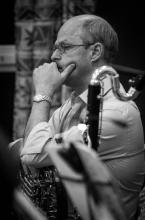
Roy has been a member for approximately 12 years having joined around 2000 although he had appeared with us numerous times prior to that as an extra or dep’ for several years beforehand. Once he joined as a member he was employed as co-principal to the then principal horn: Oliver Tunstall (son of the famous Tony Tunstall – 40 years the principal horn of The Covent Garden Royal Opera House Orchestra). Oliver and Roy shared the 1st horn chair for several years until work took Oliver away from London round about 2004-5 which meant he could no longer attend regular BSO rehearsals. Roy then took over the principal horn role permanently around September 2006. Later in November 2006 Roy was made Chairman, a post he held until May 2012. Roy’s wife Mary joined the orchestra and the horn section around about 2003-4 and has occupied our regular 3rd horn chair since around 2005. In May 2006 Roy performed as soloist playing Mozart’s Horn Concerto No.3.
Roy plays no other instrument other than the French horn which he started to learn at school. The instrument he plays on is extremely uncommon. It is an Alexander 104 – at first glance to a non-horn-players’ eye it could be mistaken for the very common Alexander 103 – recognised universally amongst horn-players as perhaps the greatest model of horn since its introduction in 1909. The 104, however, is distinguishable from the 103 due to its extra thumb valve which allows the player to instantly transpose into A or E when the player is required to hand-stop (to mute the instrument with the right hand which makes a very different sound than when using a mute) by the composer. The instrument Roy plays on has had no previous owner, Roy bought his instrument new in 1975 for £642 (a small fortune in 1975) direct from the Alexander factory in Mainz near Frankfurt Germany. Roy’s father Eric Banks at the time was Director of Music of the RAF Germany Band based in RAF Rheindahlen in north-western Germany and he drove to the famous Alexander factory to collect it for him. The current brand new price for an Alexander 104 is round about £9,000.
Roy joined the Scots Guards Band directly on leaving school in 1974 and served with them until 1998 by which time he had risen to the rank of Colour Sergeant. He was promoted to principal horn in 1987, toured the world extensively with the band and played at many major events such as investitures, state visits and ceremonial events – the wedding between Prince Charles and Lady Diana in 1981 and the handing over of Hong Kong to the Chinese in 1997 being two notable occasions. On leaving the Scots Guards Band in 1998 Roy soon started in a new (and wholly different) career in Facilities Management based in Blackfriars London but continued with the horn, playing orchestral music for fun – so much more enjoyable than playing military band music for a living he found.
Roy is not currently a member of any other orchestra although he and Mary are regularly asked to play in other local orchestras such as the Orpington Symphony Orchestra and the Sevenoaks Symphony Orchestra and they both play in a wind octet group made up of our wind section which perform together occasionally. As a horn player, Roy has a natural tendency to favour music written for big orchestras employing the horn section well and challenging them. Therefore his favourite composers tend to be those who were writing big ‘Romantic – Modern’ period works in the 100+ years between around 1830 – 1940, particularly the likes of Richard Strauss, Mahler, Bruckner, Stravinsky, Tchaikovsky, Elgar, Berlioz, Dvorak etc. Having said that, he also thoroughly enjoys playing earlier, more ‘Classical’ period works too – Mozart, Beethoven, Schubert etc.
Roy’s last concert as Chairman in May 2012 was also our first concert in our new venue – the newly built Concert Hall/theatre at Langley Park. Performing at a completely new venue for the very first time offered numerous challenges and for him as Chairman, many, many more things than normal to think of to try to ensure everything was covered. On top of this, Roy had also personally taken on looking after the soloist performing with the orchestra that day, world renowned horn player Richard Watkins.
On the evening of the concert, having just performed the concert opener – Rossini’s ‘William Tell’ overture – Roy and the rest of the horn section left the stage along with several of the woodwind whilst the strings played two short William Walton pieces between the Rossini and the Strauss horn concerto No.2 with Richard. Waiting backstage with the rest of the horn section chatting quietly with Richard whilst the strings played, it became clear to Roy that the doors at the back of the stage they had walked through were very well sound-proofed – and that there was no ‘live-feed’ piped into the backstage areas so that you could hear what was happening on stage. With everything else he’d had to think of it became clear he had overlooked how getting himself and Mary (only two horns required onstage for the Strauss) back on before the soloist for the Strauss was going to work. As the two Walton pieces were quite quiet works which couldn’t really be heard clearly backstage, Roy decided the best way to gauge when to get the two of them back on to the platform was to count the number of times he could hear applause – which could just be heard through the doors. When he gauged it was the right time to get Mary and himself back on, he waited for the appropriate applause and walked through the doors.
Immediately they emerged through the doors the orchestra and the audience started laughing hysterically and the conductor Adrian just buried his head in his hands. It emerged that whilst backstage convivially chatting with our guest soloist, Roy had miscounted the number of times the audience had applauded. The applause Roy took to be the end of the Walton was actually in response to Adrian having just announced the entrance of our soloist; horn player Richard Watkins and instead – on walks horn player Roy Banks.
Memo to self, ensure our new Chairman asks the Theatre Manager to install ‘live-feed’ recording to backstage areas for future concerts.
Andy Laing
Leader
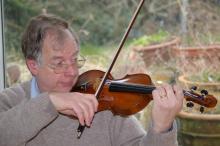
Andrew (Andy) Laing was born in Aberdeen. He started learning the violin when he was five years old and by the age of sixteen was appointed leader of the National String Orchestra of Scotland. He then gained a place at the Royal Academy of Music, where he studied violin with David Martin and later with Frederick Grinke. Andy won numerous prizes & scholarships at the RAM. While still a student he was appointed leader of the Morley College Symphony Orchestra, also regularly leading the Ealing Symphony Orchestra, the Hatfield Philharmonic and the Forest Philharmonic.
At the RAM Andy formed and led the Locrian String Quartet under the guidance of Sidney Griller. The Quartet won many prizes and scholarships, was appointed ‘Quartet in Residence’ at the University of Hertfordshire, broadcast on BBC radio and TV and gave numerous first performances of works by composers such as Nyman, Crosse and Panufnik.
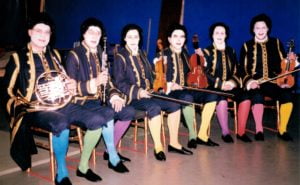 After leaving the Locrian Quartet, Andy was appointed sub-leader of the BBC Radio Orchestra, then Leader of the London City Ballet Orchestra. In the 90s, Andy spent much time on stage at the Royal Shakespeare Company, where he met his wife, Rachel (also a professional violinist, and daughter of violinist Jurgen Hess.) They now have two teenage sons, Peter and Calum, both of whom play violin. They have both represented Kent County in athletics. Andy is a keen amateur astronomer and if music had not been his first love, it is entirely possible that a career involving the stars may have followed!
After leaving the Locrian Quartet, Andy was appointed sub-leader of the BBC Radio Orchestra, then Leader of the London City Ballet Orchestra. In the 90s, Andy spent much time on stage at the Royal Shakespeare Company, where he met his wife, Rachel (also a professional violinist, and daughter of violinist Jurgen Hess.) They now have two teenage sons, Peter and Calum, both of whom play violin. They have both represented Kent County in athletics. Andy is a keen amateur astronomer and if music had not been his first love, it is entirely possible that a career involving the stars may have followed!
Catherine Borner
Flute, Piano
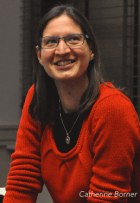
Catherine Borner studied piano and flute from the age of ten at the junior department of the Royal Academy of Music. After graduating from the University of York, she trained on the repetiteur courses at the Royal Scottish Academy of Music and Drama and the Guildhall School of Music and Drama.
Catherine has performed concertos with York University Chamber Orchestra and James Allen Community Orchestra and has appeared on BBC Radio 3 In Tune. She has also played Petrushka with Bromley Symphony Orchestra. Repetiteur work includes Aida (Kentish Opera), Anna Bolena (Tower of London Festival 2005), A Midsummer Night’s Dream, The Cunning Little Vixen, Romeo et Juliette (British Youth Opera) as well as The Gondoliers, La Traviata and The Marriage of Figaro while trainee repetiteur at English National Opera.
Alice McVeigh
Principal Cello
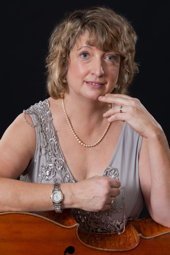
Alice McVeigh was born in South Korea, of American diplomatic parents, and lived in Southeast Asia until she was 13, when the family returned to the suburbs of Washington D.C. She then began to learn to play the cello, winning among other competitions the Beethoven Society of Washington Cello Competition, as well as being selected as a finalist in the National Music Teachers Association Young Soloists competition and the National Symphony of Washington Young Concert Artists award. She achieved a B.Mus with distinction in performance at Indiana University School of Music and in the 1980s came to London to study privately with Jacqueline Du Pre’s ‘cello daddy’, William Pleeth. Since then she has freelanced with orchestras including the BBC Symphony Orchestra, the Royal Philharmonic and Sir John Eliot Gardiner’s Orchestre Révolutionnaire et Romantique all over the EU, America and the Far East, including Carnegie Hall. In addition, she has performed cello concertos with orchestras including the Bromley Symphony Orchestra, the Waveney Sinfonia, the Stoneleigh Youth Orchestra and the Sussex Philharmonic (Dvořák, Elgar, Saint-Saëns, Don Quixote, Schelomo, etc.) She has been our cello principal since 1983.
Alice has written fiction all her life, but never attempted publication until the mid-1990s when her first two novels (While the Music Lasts and Ghost Music) were published by Orion Publishing House London, and her first play (Beating Time) in 2003 by New Theatre Productions. Alice has been married to Simon McVeigh (currently deputy Vice-Chancellor at Goldsmiths College, University of London) since 1981; and she started editing by working extensively on his first book, Concert Life in London from Mozart to Haydn, which was published by Cambridge University Press. Since the birth of their daughter, Alice has ghosted over 50 books for celebrities, academics and fellow writers. Her third book (All Risks Musical) is published by Pocket Press. Alice also writes a weekly humour column for the daily classical music magazine www.mvdaily.com.

